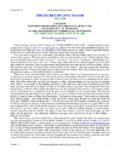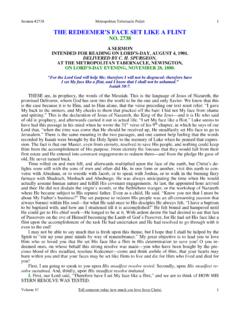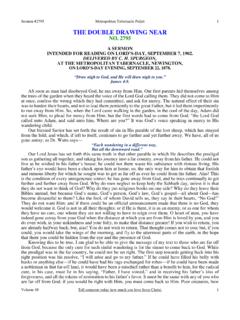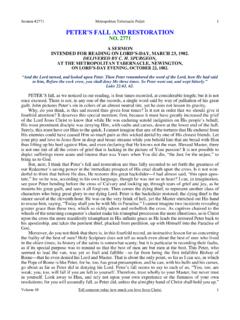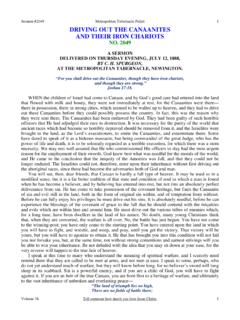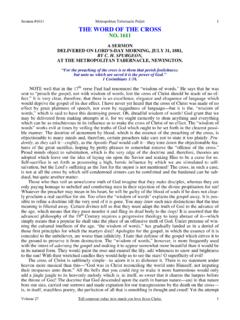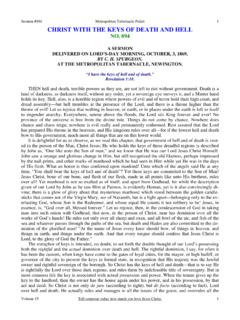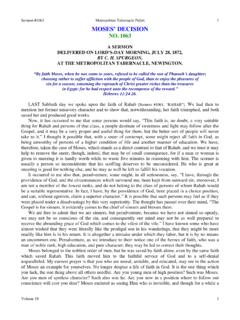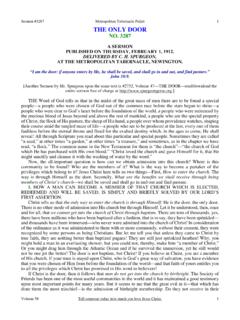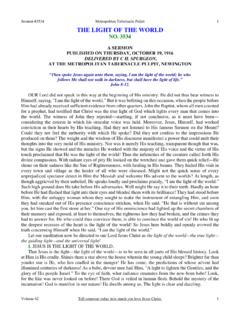Transcription of #1201 - Providence--As Seen in the Book of Esther
1 Sermon #1201 Metropolitan Tabernacle Pulpit 1. providence AS seen IN THE book OF Esther . NO. 1201. A SERMON. DELIVERED ON LORD'S-DAY MORNING, NOVEMBER 1, 1874, BY C. H. SPURGEON, AT THE METROPOLITAN TABERNACLE, NEWINGTON. Though it was turned to the contrary, that the Jews had rule over them that hated them.. Esther 9:1. YOU are probably aware that some persons have denied the inspiration of the book of Esther be- cause the name of God does not occur in it. They might, with equal justice, deny the inspiration of a great number of chapters in the Bible, and of a far greater number of verses. Although the name of God does not occur in the book of Esther , the Lord Himself is there most conspicuously in every incident which it relates. I have seen portraits bearing the names of persons for whom they were intended, and they certainly needed them, but we have all seen others which required no name because they were such striking likenesses that the moment you looked upon them you knew them.
2 In the book of Esther , as much as in any other part of the Word of God, and I had almost committed myself by saying more than anywhere else the hand of providence is manifestly to be seen ! To condense the whole of the story of the book of Esther into one sermon would be impossible, and therefore I must rely upon your previous acquaintance with it; I must also ask your patience if there should be more of history in the sermon than is usual with me. All Scripture is given by inspiration and is profitable, whether it is history or doctrine. God never meant the book of Esther to lie dumb; whatev- er it seemed good to Him to teach us by it, it ought to be our earnest endeavor to learn. The Lord intend- ed, by the narrative of Esther 's history, to set before us a wonderful instance of His providence , so that when we had viewed it with interest and pleasure, we might praise His name, and then go on to acquire the habit of observing His hand in other histories, and especially in our own lives!
3 Well does Flavel say that he who observes providence will never be long without a providence to observe. The man who can walk through the world and see no God is said upon inspired authority to be a fool but the wise man's eyes are in his head; he sees with an inner sight and discovers God everywhere! It is his joy to perceive that the Lord is working according to His will in heaven, earth and in all deep places. It has pleased God at different times in history to startle the heathen world into a conviction of His presence. He had a chosen people to whom He committed the true light, and to these He revealed Him- self continually. The rest of the world was left in darkness, but every now and then the divine glory flamed through the gloom as the lightening pierces the blackness of storms. Some, by that sudden light of God, were led to seek after God and found Him; others were rendered uneasy and without excuse, though they continued in their blind idolatry.
4 The wonderful destruction of Pharaoh and his armies at the Red Sea was a burst of light which startled the midnight of the world by giving proof to mankind that the Lord lived and could accomplish His purposes by suspending the laws of nature, and working mira- cles! The marvelous drama enacted at Shushan, the capital of Persia, was intended to be another mani- festation of the being and glory of God, working not as formerly, by a miracle, but in the usual methods of His providence , and yet accomplishing all His designs. It has been well said that the book of Esther is a record of wonders without a miracle, and therefore, though equally revealing the glory of the Lord, it sets it forth in another fashion from that which is displayed in the overthrow of Pharaoh by miraculous power. Let us come now to the story. There were two races, one of which God had blessed and promised to preserve, and another of which He had said that He would utterly put out the remembrance of it from under heaven.
5 Israel was to be blessed and made a blessing, but of Amalek the Lord had sworn that, The Lord will have war with Amalek from generation to generation. These two peoples were, there- fore, in deadly hostility, like the seed of the woman, and the seed of the serpent, between which the Volume 20 Tell someone today how much you love Jesus Christ. 1. 2 providence As seen in the book of Esther Sermon #1201. Lord, Himself, has put at enmity. Many years had rolled away; the chosen people were in great distress, and at this time there still existed upon the face of the earth some relics of the race of Amalek. Among them was one descended of the royal line of Agag, whose name was Haman. He was in supreme power at the court of Ahasuerus, the Persian monarch. Now it was God's intent that a last conflict should take place between Israel and Amalek; the conflict which began with Joshua in the desert was to be finished by Mordecai in the king's palace!
6 This last struggle began with great disadvantage to God's people. Haman was prime minister of the far-extending empire of Persia, the favorite of a despotic monarch who was pliant to his will. Mordecai, a Jew in the employment of the king, sat in the king's gate. When he saw proud Haman go to and fro, he refused to pay him the homage which others rendered insincerely. He would not bow his head or bend his knee to him, and this exceedingly galled Haman. It came into his mind that this Mordecai was of the seed of the Jews, and with the remembrance came the high ambition to avenge the quarrel of his race. He thought it scorn to touch only one man, and resolved that in himself he would incarnate all the hate of generations; and at one blow sweep the accursed Jews, as he thought them, from off the face of the earth! He went to the king, with whom his word was power, and told him that there was a singular people scattered up and down the Persian empire, different from all others, who opposed the king's laws, and that it was not for the king's profit to let them live.
7 He asked that they might all be destroyed and he would pay into the king's treasury an enormous sum of money to compensate for any loss of revenue by their destruction. He intended that the spoil which would be taken from the Jews should tempt their neighbors to kill them, and that the part allotted to him would repay the amount which he advanced, thus he would make the Jews pay for their own murder! He had no sooner asked for this horrible grant than the monarch conceded it; taking his signet ring from off his finger, he bade Haman do with the Jews as seemed good to him. Thus the chosen seed were in the hands of the Agagite who thirsted to annihilate them! Only one thing stands in the way. The Lord has said, No weapon that is formed against you shall prosper, and every tongue that rises against you in judgment, you shall condemn. We shall see what happens, and learn from it. I. First, we shall learn from the narrative that GOD PLACES HIS AGENTS IN FIT PLACES FOR.
8 DOING HIS WORK. The Lord was not taken by surprise by this plot of Haman; He had foreseen it, and forestalled it. It was necessary in order to match this cunning, malicious design of Haman, that someone of the Jewish race should possess great influence with the king. How was this to be effected? Should a Jewess become Queen of Persia, the power she would possess would be useful in counteracting the en- emy's design, and this had been all arranged years before Haman had concocted in his wicked heart the scheme of murdering the Jews! Esther , whose sweet name signifies myrtle, had been elevated to the position of Queen of Persia by a singular course of events. It happened that Ahasuerus, at a certain drinking bout, was so far gone with wine as to forget all the proprieties of Eastern life. He sent for his queen, Vashti, to exhibit her to the people and the princes. No one dreamed, in those days, of disobeying the tyrant's word, and therefore, all stood aghast when Vashti, evidently a woman of right royal spirit, refused to degrade herself by be- ing made a spectacle before that ribald rout of drinking princes.
9 She refused to come! For her courage Vashti was divorced, and a new queen was sought. We cannot commend Mordecai for putting his adopt- ed daughter in competition for the monarch's choice, for it was contrary to the law of God and danger- ous to her soul in the highest degree. It would have been better for Esther to have been the wife of the poorest man of the house of Israel than to have gone into the den of the Persian despot! The Scripture does not excuse, much less commend, the wrong doing of Esther and Mordecai in thus acting, but simp- ly tells us how divine wisdom brought good out of evil, even as the chemist distils healing drugs from poisonous plants. The high position of Esther , though gained contrary to the wisest of laws, was overruled for the best interests of her people. Esther , in the king's house, was the means of defeating the malicious adversary! But Esther alone would not suffice; she is shut up in the harem, surrounded by her chamberlains and her maids of honor, but quite secluded from the outside world.
10 A watchman was needed outside the palace to guard the people of the Lord, and to urge Esther to action when help is needed. Mordecai, her cousin and foster father, obtained an office which placed him at the palace gate. Where could he be better post- 2 Tell someone today how much you love Jesus Christ. Volume 20. Sermon #1201 providence As seen in the book of Esther 3. ed? He is where much of the royal business will come under his eyes, and he is quick, courageous, and unflinching. Never had Israel a better sentinel than Mordecai, the son of Kish, a Benjamite a very dif- ferent man from that other son of Kish who had allowed Amalek to escape in former times! His relation- ship to the queen allowed him to communicate with her through Hatach, her chamberlain. When Ham- an's evil decree was published, it was not long before intelligence of it reached her ear, and she felt the danger to which Mordecai and all her people were exposed.
